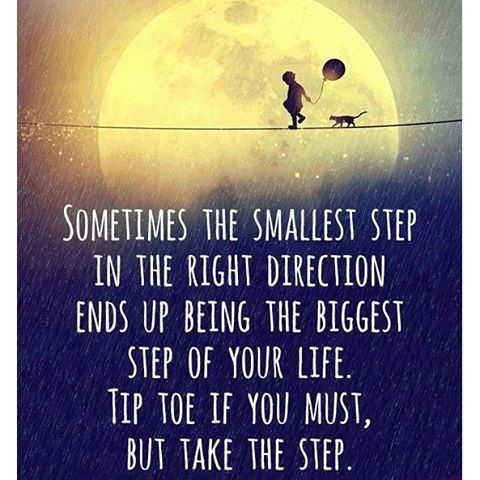
True champions set a high bar for themselves, but to reach that goal, they must be willing to develop the mindset and skills to stay motivated. We can learn from their example and arm ourselves with knowledge and practices that we can use whenever we feel overwhelmed by the road ahead of us. These five guidelines will help you get back on track with and stay motivated. (Estimated reading time: 5 minutes)
“It always seems impossible until it’s done.”
— Nelson Mandela
We’ve all done it: You get fired up about a new opportunity or idea and rush into action. But somewhere along the way, you lose steam, your interest wanes, and the process becomes harder and messier than you expected.
You begin questioning whether your quest is worth the effort. After going back and forth in your mind, you finally let go, feeling defeated and disillusioned.
But quitting isn’t always a luxury that’s available to us. What if you‘ve made a commitment with your time, money, or affections? When the going gets tough in these situations, you can’t just throw in the towel and give up.
Whether it’s a partnership, a job, or a project that you’re deeply invested in, there will be times when it’s going to feel like a lot more work than you signed up for. You may have to deal with a partner who’s having a cranky spell, or have to work overtime because of a deadline. When it feels like it’s the last straw, quitting isn’t an easy option.
I’ve been experiencing these emotions myself through the academic rigors of an intense Masters program in journalism. On looking back over the past few months, I see how each day has been a game of whack-a-mole, with me trying to complete each task that kept pouring in.

My fellow students and I were visibly burnt out by the semester mid-point. Drooping eyes, unkempt hair, and incoherent speech due to sleep deprivation were common to encounter in classes. Caffeine became our best friend.
There were some days when I fantasized about tossing my books out and going on some grand adventure, unfettered by any demands on my time and energy.
But then I remembered one of my favorite quotes by motivational guru, Jim Rohn:
“Don’t wish it was easier, wish you were better. Don’t wish for less problems wish for more skills. Don’t wish for less challenge wish for more wisdom.”
The truth is that true champions set a high bar for themselves, but to reach that goal, they must be willing to develop the mindset and skills to stay motivated. They realize that the prize is not only in the results, but in the process. The key is to find a way to love the process as much as you love the outcome.
To become a master, you have to put in the work and stay motivated while you’re doing it. Malcolm Gladwell wrote in his book, Outliers, that success stories like The Beatles and Bill Gates only started seeing the fruits of their labor after they reached 10,000 hours of practice.

We see the 10,000 hours of practice rule applied by masters from all fields, especially sports. Kobe Bryant, one of the most successful basketball players of all time, had a routine that looked like this when he was at his peak:
According to his trainer, Robert, “Kobe started his conditioning work around 4:30am, continued to run and sprint until 6am, lifted weights from 6am to 7am, and finally proceeded to make 800 jump shots between 7am and 11am.”
Bryant’s grueling routine is a testament to his devotion to improving every single day. Champions like him understood that it’s committing to daily rituals that eventually produces success. They revel in both the wins and the losses and press on through both good and bad days.
When you’re dealing with the minutiae of daily annoyances, it’s a combination of internal drive and strategic time management that’ll help you ease over the bumps.
Here are five things you can do to stay motivated when you find yourself feeling overwhelmed:
1. Take strategic breaks: Many people equate high productivity with working non-stop, yet workaholic tendencies only lead to burnout and frustration. Regular breaks are a must, no matter how much you have on your plate. Breaks should occur at regular intervals through the day and allow you to step away from your desk and disconnect.
Engage in activities that energize you like a brisk walk, lunch with a friend, watching a TV show, or napping – whatever helps you unplug and shift your focus toward something else for a while.
2. Focus on doing things one at a time: Multitasking is a sure-fire way to feel overwhelmed, which will also affect the quality of your work. When you attempt to do several projects at once, your energy, time, and resources are diluted. You waste precious time switching from task to task, most of which will remain incomplete.
A better way to deal with your to-do list is to tackle each task one at a time, giving each one your full attention and focus. Start with the activity that you find hardest, have closer deadlines and will produce the most results.
3. Prioritize self-care: When we’re busy, our self-care routines tend to fall by the wayside. For most people, that’s the first thing they eliminate because it’s seen as a luxury and not a necessity. But just like a car that needs fuel and oil changes regularly to function at full capacity, we need to fuel our inner engines to be at our peak. Avoid skimping on the basics like sleep, exercise, and nutritious food. Make time for activities that bring your joy and peace.
4. Stay connected to your vision: When feeling bogged down, step back and ask yourself why each task is important to you and how it contributes to your wider goals. It’s easy to get stuck in a routine and lose sight of the greater vision that you have for your life. Having a clear purpose will compel you to move forward. It will help you prioritize activities that contribute to your goals and eliminate the ones that don’t serve you.
5. Organize your thoughts and environment: Your physical environment is a reflection of your inner world – that’s why it’s difficult to organize your mind when your physical space is messy. If you have papers strewn all over your office or unwashed dishes that have been lying in the sink for days, attend to those first. According to Feng Shui, clutter causes our creative cycles to become interrupted. Cleaning up allows you to organize your thoughts, and you’ll go back to work with a fresh perspective.
Rwandan writer, Bangambiki Habyarimana, said that success in life is not for those who run fast, but for those who keep running and are always on the move. What’s needed most in the pursuit of personal success isn’t speed, but endurance, fueled by an unwavering sense of hope and belief that you have what it takes to cross the finish line.
All my best on your journey,
Seline

Question for you: What do you do to stay motivated when you feel overwhelmed by demands? What are your best practices on how to stay motivated?
Did you like this post? Sign up below, and I’ll send you more awesome posts like this every week.

Hi Seline! I like what you have shared here and agree with it. But, I have a question. How do you priorities self-care when you are the sole caretaker for family members with serious illnesses like cancer? I am the sole caretaker as well as the sole provider for myself and my husband who has cancer. half my day is spent taking care of him adn the other half is spent working so we can stay fed and clothed and have a home. My self-care is usually a shower at night before I pass out for 4 -5 hrs then get up and do it all again. There is no time for self-care without taking time away from my husband’s care or work that keeps us off the streets. I just don’t know how to work it in- any tips or suggestions? :-/